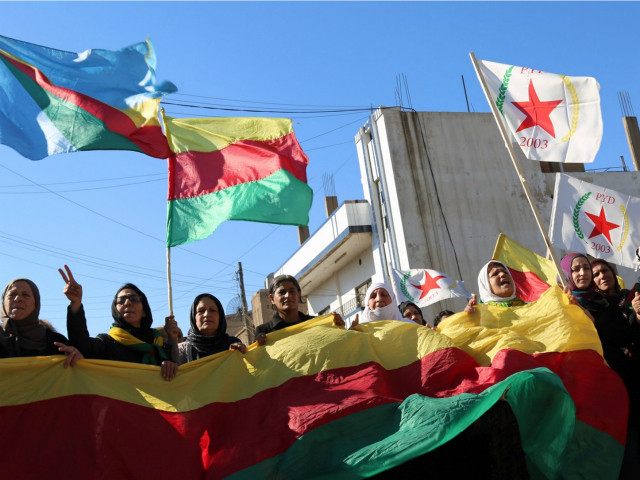The U.S. Department of Defense (DOD) stands against “any terrorist group” that attacks Turkey, a Pentagon spokesperson indicated to Breitbart News.
However, Turkey and the United States disagree on which groups should be considered terrorists.
Turkey has long considered the U.S.-backed Kurdish Democratic Union Party (PYD), which controls large swathes of northern Syria, and its armed wing the People’s Protection Units (YPG), to be affiliates of the Kurdistan Workers Party (PKK).
The communist separatist PKK, which is based in Turkey, has been designated a terrorist group by both Washington and Ankara. Erdoğan has accused the YPG of carrying out terrorist attacks in Turkey.
Meanwhile, President Barack Obama’s Department of State (DOS), contradicting Turkey’s position on the Syrian Kurdish groups, has repeatedly declared that it does not consider the PYD or the YPG to be terrorist groups.
“As we have said in past, the PKK is a designated foreign terrorist organization, and we stand with our NATO Ally Turkey and condemn attacks by any terrorist group against Turkey, including attacks by both ISIL and the PKK in the past few days,” U.S. Maj. Adrian Rankine-Galloway, a Pentagon spokesman, told Breitbart News.
His comments came after Secretary of Defense Ash Carter, echoing Turkey’s position, told the Senate Armed Services Committee on April 28 that he believes the Syrian Kurdish groups are aligned with the PKK.
Breitbart News asked the Pentagon whether it considers the Syrian Kurds to be terrorists like the PKK.
Although Maj. Rankine-Galloway did not explicitly back away from Carter’s position on the relationship between the Kurdish groups, he also failed to say whether the Pentagon considers the PYD and YPG to be terrorists.
Hours after Carter testified before the lawmakers, John Kirby, a DOS spokesman, reiterated that the State Department has not designated the PYD, or the YPG, as a terrorist organization. He also refused to specifically say whether DOS agreed with Secretary Carter’s position.
Turkish President Recep Tayyip Erdoğan lambasted the Obama administration for making “contradictory statements” on Syrian Kurdish groups.
America’s NATO ally Turkey remains part of the U.S.-led coalition against the Islamic State (ISIS/ISIL) despite its objections to the Obama administration’s support for the YPG in its fight against ISIS.
The Pentagon spokesman stressed the Obama administration’s position that YPG fighters, who are backed by the U.S.-led coalition against ISIS, are among “one of the most effective ground forces” combating the jihadist group in Syria.
Kurdish YPG fighters make up the bulk of the U.S.-backed Syrian Democratic Forces (SDF) fighting ISIS on the ground, acknowledged Gen. Joseph Dunford, chairman of the Joint Chiefs of Staff, when he testified alongside Carter on April 28.
Turkey has been accused of not doing enough to combat ISIS, many experts allege. Particularly, some analysts believe Turkey could do more to stem the flow of foreign fighters traveling through its territory to join ISIS in Iraq and Syria and to prevent the jihadist group from generating revenue from the illicit sale of oil.
Turkey has also been accused of lending support to al-Qaeda-linked groups fighting the Bashar al-Assad regime in Syria.
Secretary Carter’s comments about the PYD, YPG, and PKK came in response to a question by Sen. Lindsey Graham (R-SC).
“I just got back from Turkey. They’re not okay with this. They think this is the dumbest idea in the world, and I agree with them,” Graham told Carter, referring to the Obama administration providing support to the Syrian Kurds.
“So if you’re wondering why Turkey is a little upset, we’re arming people inside of Syria aligned with a terrorist group that’s fighting the Turkish government,” he later added, suggesting that he agrees with Ankara’s position that the Syrian PYD and YPG are affiliates of the terrorist PKK group.
Sen. Graham did say Turkey could do more to combat the Islamic State.
Turkey is threatened by steps the PYD-led Kurds are taking towards establishing their own independent state in northern Syria.
Turkey, which has experienced an increase in PKK-linked terrorist attacks, is alarmed that changes among the Kurdish population in neighboring Syria could fuel separatism among the Kurdish population within its borders.

COMMENTS
Please let us know if you're having issues with commenting.